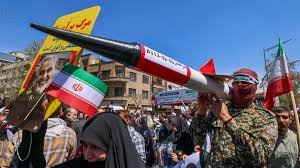
WAR-REPORT : Iran has not retaliated quickly against Israel because Iran very likely seeks to ensure that its next attack restores deterrence with Israel while simultaneously avoiding a large-scale war. Iran previously attacked Israel on April 13, 12 days after Israel killed one of Iran’s senior-most military commanders in Syria on April 1. Iran and its allies fired around 170 one-way attack drones, 30 cruise missiles, and 120 ballistic missiles at Israel in its April 2024 attack.
The United States, Israel, and their allies intercepted most of the projectiles, and the Iranian attack did significantly less damage than Tehran intended. Iranian leaders are therefore incentivized to carefully and slowly calculate their next attack to ensure that the attack inflicts serious damage on Israel, thereby restoring Iranian deterrence with Israel.

Iran will likely also ensure that the attack will not trigger a major war. Western intelligence sources previously assessed that Iran and Lebanese Hezbollah may attack Israel on the Jewish holiday Tisha B’Av on August 12-13, although Iran might wait longer to conduct its next attack to ensure that the attack achieves its strategic goals.
Iran also intends to stoke fear and anxiety among Israelis by slowing its response and capitalizing on speculation about when and how it will respond. Iranian armed forces-run outlet Defa Press claimed on August 11 that Iran is conducting a “flawless psychological war” against Israel by drawing out its retaliation. Defa Press claimed that Iran’s psychological war on Israel has disrupted Israelis’ daily routines and stagnated the Israeli economy. Defa Press also claimed that many Israelis have tried to flee Israel since the start of the Israel-Hamas war in October 2023.

This claim is consistent with CTP-ISW’s assessment that part of Iranian leaders’ theory on how to destroy Israel revolves around stoking instability and terror in Israel to catalyze reverse migration away from Israel. A member of the Iranian Parliamentary National Security and Foreign Policy Committee separately asserted on August 10 that “keeping Israel in limbo is part of the revenge operation.” Iran similarly exploited uncertainty surrounding its “imminent” attack in April 2024 to stoke terror in Israel, as CTP-ISW previously reported on April 11, two days before Iran attacked Israel on April 13.
Key Takeaways:
- Iranian Retaliation: Iran has not retaliated quickly against Israel because Iran very likely seeks to ensure that its next attack restores deterrence with Israel while simultaneously avoiding a large-scale war. Iran also intends to stoke fear and anxiety among Israelis by slowing its response and capitalizing on speculation about when and how it will respond.
- Iraq and Syria: The August 10 drone attack that targeted US forces at the Rumalyn Landing Zone in northeastern Syria wounded several US and coalition personnel. An unspecified US official told Reuters that some personnel are undergoing testing for traumatic brain injuries.
- Gaza Strip: The IDF issued evacuation orders for central Khan Younis on August 10.









